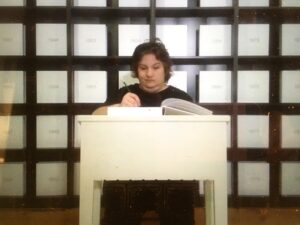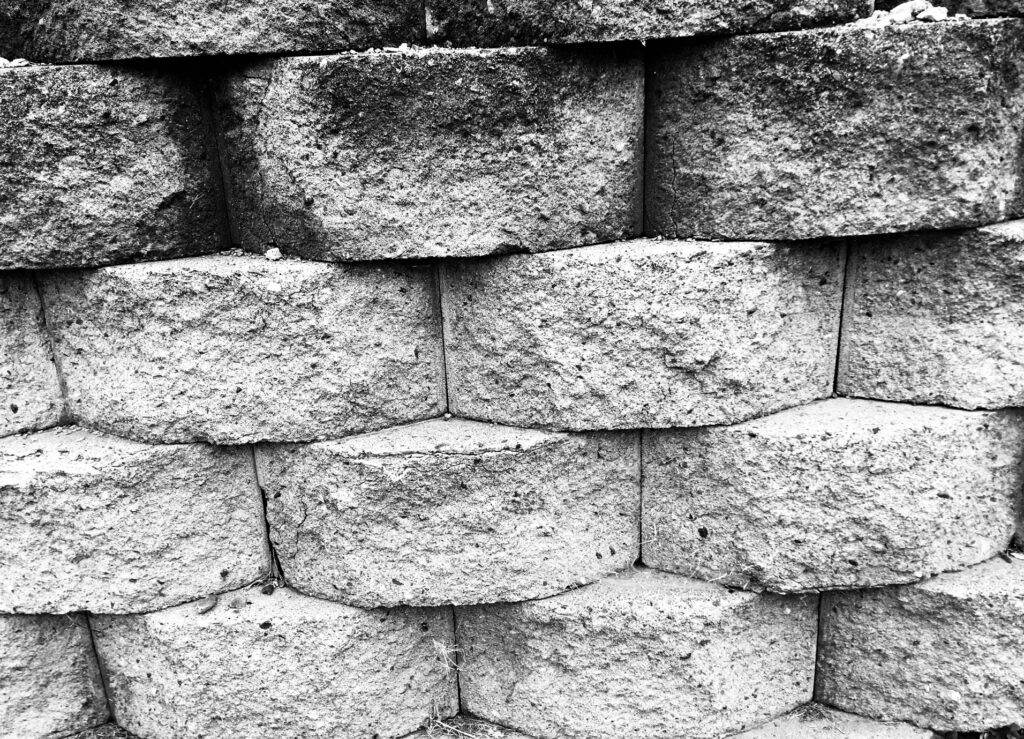I have been trying to figure out how to introduce you to Amy Stacey Curtis without using cliches like brilliant and tropes like outside-of-the-box artist. And then suddenly I decided that I couldn’t wait until I got it right (or at least “righter”), or, more importantly from a personal perspective, until I got anything right (or at least righter). Getting things into better / great / fabulous shape is what has prevented me from putting a fair amount of work into the world—and could have prevented me from directing you to her work, her story.

Given the nature of Amy’s work (installations in large, abandoned Maine mills, over many years, with their participatory nature—aahhh, yes, always remember her work requires us showing up, other humans, the community), it always feels as if she has it all figured out: specificity of thought and design; deep, analytical perceptions. None of which I feel I have. Really, I don’t even understand the nature of her work, that kind of work. That ephemeral presence.
patterns, randomness, chaos, order, repetition, things like counting a half million grains of sand before and after we have handled them
FINDING AMY:
- First, Catherine Stakel (another whole story!) enters my life 20+ years ago
- Catherine Stakel stays in my life, tenacious love
- She loves (Catherine is a glow of love) to talk with this young artist who moves her
- I drive to the Bates Mill, Lewiston, to experience Amy’s first show
- I don’t get it
- I don’t get any of them (except for the drawings she does to sell, to raise money, I think; I want to buy one but I can’t—they are visually compelling)
- I attend some, not others
And then these last days, closed up in my apartment, still in pandemic mode, I begin showing up for her latest online experiential installation on MEMORIES. She asks for our memories, no more than 200 words; she will read them anonymously over 9 days, twice a day, over 18 hours. THROUGH 10/27. THERE’S STILL TIME.

Amy shows up, despite all the reasons (another story) she might not. I am moved by the showing up. By the vision and process and presence. By the everything of this, whatever it is. Everything does not need a name, a box.
HERE is what I recently observed after five days of being with: I seem to have committed my schedule to showing up at 11 a.m. and 5 p.m. every day. There’s an energy, a force, to these readings that speaks to the universal and to our connectivity. I make myself stop all other projects to enable me to be in the flow of it all, the black and white linear setting, those beautiful books, the dates on the facing covers, the light, the way you come to us, your care. I sit and wait patiently while you scribe, a stillness I have been aching towards for months now and unable to access. I love the way your body, your being, is the only un-angled vision in the room, the way outside (I assume) sounds sometimes show up, the scratch of your pen(cil) on the page, the memories of others sending me words/phrases that jump out and insist they are asking me to notice them. For something. Who knows? But something.
HERE are the memories I sent once I realized I could:
1986:
We are sitting inside a coffee shop at the airport, my brother and I. Sound has been sucked away, creating a silence that is oddly comforting. People are walking. Many people, their faces turned often toward each other, their mouths opening and closing, their heads sometimes thrown back or nodding.
“Are you okay?” I ask. I’m not sure what I mean by that. I know he isn’t okay. The knife, the smack, the Cadillac and the guy sitting in it—maybe there were even guns—none of that was okay. And it was definitely not okay in my mother’s house.
“I’m fine,” he says. “It’s for the best. They aren’t safe.”
You had to love him for that, for recognizing that he was a danger to these two people who had created us and taken care of us, and he didn’t want to be.
“You know, I love you,” I say.
“I do,” he says. “You wouldn’t have done this if you didn’t.”
I am wondering whether he understands that I promised our mother I would make sure he didn’t pawn the ticket for money for his arm and never fly away.
1995
“You have Nana’s hands,” my daughter says.
I look down. The watery-looking veins rise just enough to see the intimation of my mother, the same one who sits in a box on a shelf by the pencil sharpener and the bills now. She always will. I can’t make myself slit the cardboard and spill her out—bone fragments they had warned. A mother as dusty ashes, but not as shattered femurs that balanced me or pelvic bones that birthed me or splintered phalanges that fluttered close. But never close enough.
My daughter flattens a vein with her thumb, only to lift off suddenly. I see the vein fill up with blood, feel it pop up. I hear flies stuttering against the window glass. I smell tomatoes bubbling in the stew pot. I look down at our woman hands, my daughter’s and mine. I feel skin against skin, and I know. I will always be hungry for hands—sweaty, cold, chapped, elegantly thin, perfectly broad, scabbed, shriveled, thick-veined, warm the way I like them in my palm, against my cheek, dangling from my shoulder.
2001
I am standing here. Just standing, unable to bend or move—my chin at an angle even I can recognize as odd, my jaw clenched, no words possible, arms locked at my sides. I know that I will be the last person who knew my son to see him, the only one to see him like this—lying on a table, not a bed but a table high enough for him and me to be kneading bread. That’s it. It’s counter height. My twenty-one-year-old son is lying on a counter.
Counters are familiar, and so now I can, after fifteen or twenty minutes, maybe an hour, I think, of just standing, standing here, by my unbreathing son, I can finally take his hand. I used to do that years ago when we made bread together, weaving my fingers through his, laying my calloused palms on his tiny knuckles, his long bony fingers, my aproned stomach pressed up against his back. His head was there against my heart. I could practically hear him thinking, this cerebral, funny boy of mine, who would continue to consider the torque of engines and the laughter of lions right through his last days.
2004
After a handful of years living on my own (I started to say “again,” but I had never before lived on my own), I said to myself, pretty much verbatim—and I remember it was out loud in my apartment in the old high school, looking out over the patina’d copper dome of the library, bulbous deep-winter clouds afloat in the city sky (funny the pieces that stick)—I said: “Self, if I were to be maybe open to someone in the future, this is what I would want: someone brilliant and creative, funny. Someone who doesn’t live here and doesn’t call me every night, and when he does call and I’m not home, doesn’t ask me where I was when he called.” If I had known the delivery would be so precise, I might have tempered the “independent” part a bit.
2008
I meander downstairs and around the corner to last night’s restaurant for coffee, some eggs, rye toast, real butter. The same waitress is working the morning shift, her hair laced up in a braided knot, the wiry strands barely controlled. She smiles, coffee carafe in hand. “Your husband’s not with you this morning?”
I look up, surprised to hear that description of you and me. “He loves you so much. It was so clear I couldn’t miss it,” she explains, reading, I think now, my face telegraphing How could you so instantly read this impossible couple, us, as that solid?
2018
I am choking on dreams—it started that night after the night after I laid my left ear—the one of the three earrings, now only undressed holes—against the insidious pulse of his throat, rings of piano notes throbbing up through his slack lips, cracked lips of departure, my lips sewn into his.
Who would have thought he could leave that way? His skin unblemished and raw, how could I have seen all of that and known that love was expansive beyond the moment, beyond the planet, beyond the crunch of bone and unfatted fat?
That is when I understood, my fingers on the deep, winded flesh of his cheek.
AMY’S WEBSITE: https://www.amystaceycurtis.com/
Discover more from Annaliese Jakimides
Subscribe to get the latest posts sent to your email.